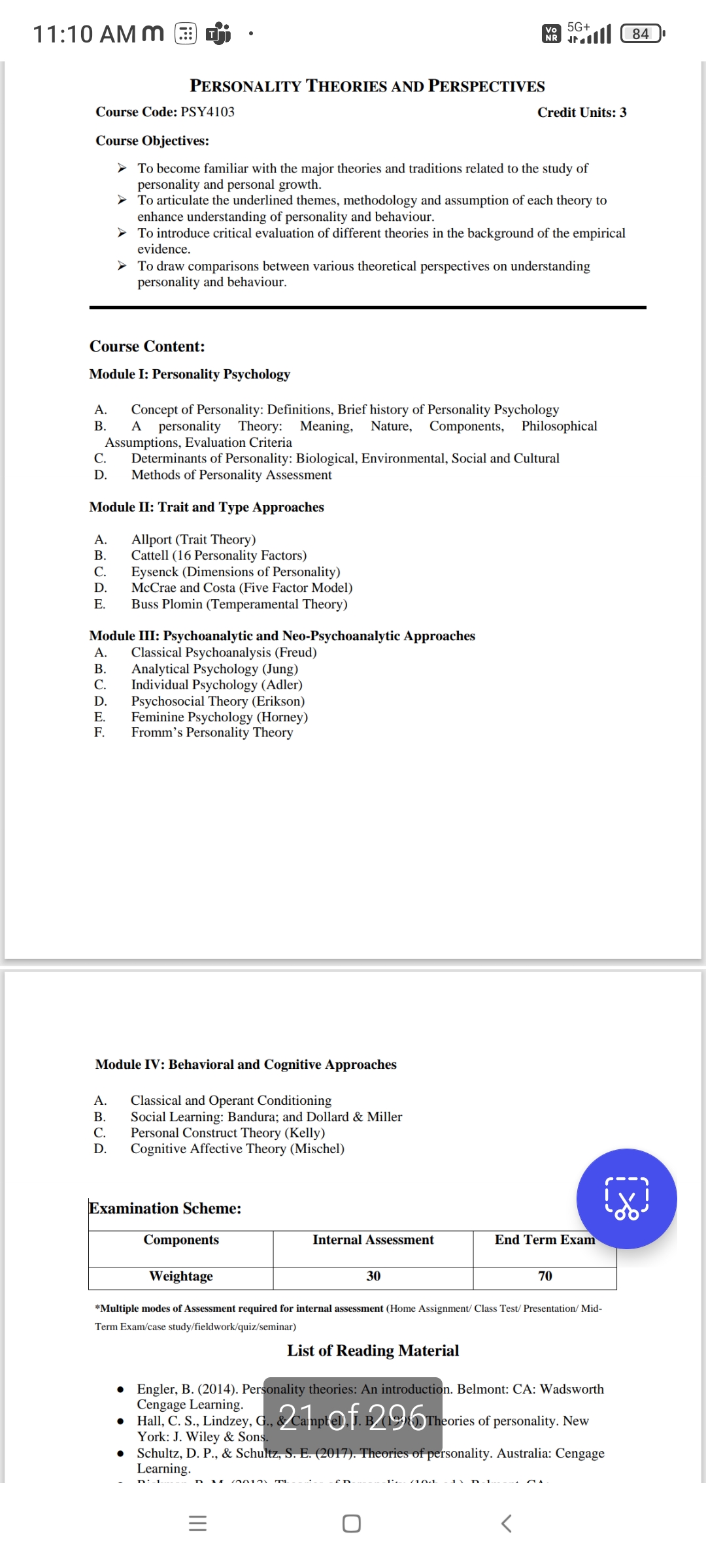Personality Theories: Course Overview and Objectives
Personality Theories and Perspectives

Course Information
Course Code: PSY4103
Credit Units: 3
Course Objectives
-
Familiarization with Major Theories: Understand various theories related to personality and personal growth.
- Note: This involves studying foundational theories that explain how personalities develop and differ among individuals.
-
Articulation of Themes and Methodologies: Explore themes, methods, and assumptions to enhance comprehension of personality and behavior.
- Insight: Methodologies might include observational studies, experiments, and longitudinal research.
-
Critical Evaluation of Theories: Assess different theories using empirical evidence.
- Additional Info: Empirical evidence refers to the information acquired by observation or experimentation that is then documented and validated.
-
Comparison of Theoretical Perspectives: Analyze the differences and similarities between theoretical approaches to understanding personality.
- Note: This may include comparative analysis between behaviorist and psychoanalytic perspectives, among others.
Course Content
Module I: Personality Psychology
- Concept of Personality:
- Definition & History: Understanding what personality is and its evolution within psychological study.
- Personality Theory:
- Meaning & Components: Discuss nature, philosophical assumptions, and evaluation criteria.
- Determinants of Personality:
- Biological, Environmental, Social & Cultural: Explore how these factors shape personality.
- Methods of Personality Assessment:
- Note: Techniques might include questionnaires, observational studies, and various psychometric tests.
Module II: Trait and Type Approaches
- Allport (Trait Theory):
- Insight: Focuses on identifying core traits that define an individual's personality.
- Cattell (16 Personality Factors):
- Note: A model that defines personality through 16 trait dimensions.
- Eysenck (Dimensions of Personality):
- Insight: Proposes a model with dimensions like extraversion/introversion and stability/neuroticism.
- McCrae and Costa (Five Factor Model):
- Additional Info: Also known as the "Big Five," includes openness, conscientiousness, extraversion, agreeableness, and neuroticism.
- Buss & Plomin (Temperamental Theory):
- Insight: Examines personality based on biological temperaments evident from early life.
Module III: Psychoanalytic and Neo-Psychoanalytic Approaches
- Classical Psychoanalysis (Freud):
- Note: Focuses on the influence of unconscious processes and childhood experiences.
- Analytical Psychology (Jung):
- Insight: Introduces concepts like archetypes and the collective unconscious.
- Individual Psychology (Adler):
- Additional Info: Emphasizes the unique motivations of individuals and the importance of social interest.
- Psychosocial Theory (Erikson):
- Note: Highlights social development across the lifespan through various stages.
- Feminine Psychology (Horney):
- Insight: Challenges some of Freud's theories and emphasizes the sociocultural factors in personality.
- Fromm’s Personality Theory:
Module IV: Behavioral and Cognitive Approaches
- Classical and Operant Conditioning:
- Insight: Behavioral theory focusing on learned behaviors via reinforcement and punishment.
- Social Learning (Bandura; Dollard & Miller):
- Note: Highlights the importance of observing and modeling the behaviors of others.
- Personal Construct Theory (Kelly):
- Insight: Focuses on individuals as personal scientists using constructs to make sense of the world.
- Cognitive Affective Theory (Mischel):
- Additional Info: Examines how cognitive processes and situational variables interact to affect personality.
Examination Scheme
| Components | Internal Assessment | End Term Exam |
|---|---|---|
| Weightage | 30 | 70 |
- Internal assessment includes modes like home assignments, class tests, presentations, mid-term exams, etc.
List of Reading Material
- Engler, B. (2014): "Personality Theories: An Introduction."
- Hall, C. S., Lindzey, G., & Campbell, J. B. (2015): "Theories of Personality."
- Schultz, D. P., & Schultz, S. E. (2017): "Theories of Personality."
- More resources listed in the course for comprehensive understanding.
Extended readings:
spsp.org
[PDF] Course: Psyc 4401 - Theories of Personality
docs.bartonccc.edu
[DOC] PSYC 1034 Theories of Personality.doc - Barton Community College
catalog.utsa.edu
Psychology (PSY) < The University of Texas at San Antonio